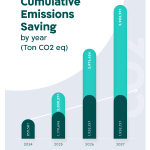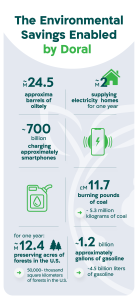-
- Developing and generating for our planet
- Doral’s Contribution to Reducing Emissions and Addressing for Climate Change
-
Innovation
Full chapter- Innovation
- A Leader in Israel’s Energy Storage Sector
- Doral Tech – Energy of Innovation
- A Bridge to Academia and Future Technologies
- Leading the Field of Dual-Use Renewable Energy Production in Israel
- Development of ‘Green Hydrogen’ Projects
- Development and Management of Environmental Infrastructure Integrated with Renewable Energy
- At the Forefront of Israel’s Green Electricity Market
- Reducing Water Consumption
- Preserving Biodiversity
- Waste Treatment and Promotion of Circular Economy
- Our Overall Environmental Impact – Greenhouse Gas Emissions Data
- Progress Against Targets
-
-
- Responsible and Ethical Management of Our Business
-
Corporate Management at Doral
Full chapter - Corporate Governance for ESG
- Business Ethics and Compliance at Doral
- Preventing Bribery, Corruption, and Conducting Internal Audits
- Information Security and Business Continuity
- Risk Management
- Responsibility in Our Value Chain
- Progress Against Our Targets
-

Doral’s Contribution to Reducing Emissions and Addressing for Climate Change
-
160,276 tons
tons of CO2e emissions prevented by green electricity production compared to conventional production
-
115 million ILS
invested in research, development, and implementation of technologies addressing the climate crisis
-
~6 million ILS
invested in environmental infrastructure solutions
-
210 tons of CO2e
Scopes 1 and 2 emissions
-
11,689,734 tons
CO2e expected savings between the years 2024-2030
-
232,154 tons of CO2e
Scope 3 emissions
-
~807 million ILS
invested by the company in initiating and establishing renewable energy projects
Doral, through its core activity of initiating and establishing renewable energy systems as an alternative to fossil fuels, effectively implements the transition from polluting energy production to green energy production across a wide range of applications and technologies. In doing so, the Company aligned with Israel’s efforts to increase the share of renewable energy in total electricity production, as well as the global effort to transition to renewable energy and reduce greenhouse gas emissions, as well as supporting ancillary regulations.
Doral’s green electricity production in Israel in 2023 amounted to 351.3 GWh, which in conventional production would result in emissions equivalent to approximately 160,276 tons of CO2e (carbon dioxide equivalents). By 2030, Doral’s cumulative contribution to global emissions reduction is expected to reach 11,689,734 tons of CO2e.1 This savings is in addition to the 160,276 tons of CO2e we prevented in 2023.Cumulative savings rate of carbon dioxide equivalents (tons of CO2e) by 2030, based on the Company’s forecasts until 2026 (for the remaining years, the 2026 data was multiplied).


Environmental Management
Doral’s environmental management in Israel is carried out on a project basis by project managers in collaboration with a range of leading environmental consultants contracted by the Company. These consultants support regulatory compliance from the project’s inception to its operation. The environmental consultants use monitoring and control systems to assess the environmental impacts at the Company’s production facilities.
In Doral Environmental Infrastructure projects, the best available techniques (BAT) are a mandatory guideline from the Ministry of Environmental Protection during the planning and establishment of biogas facilities and waste-to-energy facilities. Accordingly, the Company collaborates technologically and commercially with the world’s leading and most experienced technology companies.
At the beginning of 2023, Doral appointed a designated manager for environmental sustainability within the Company and began the process of implementing an environmental quality management system and supporting procedures.
As mentioned, the Company’s environmental consultants use monitoring and control systems to assess environmental impacts at the Company’s production facilities. Additionally, the Company has initiated an environmental compliance survey process to establish a system for managing, controlling, and monitoring its environmental activities, intending to implement this system by the end of 2025.
Doral operates to reduce environmental impacts throughout the entire value chain – at sites and offices:
| In Planning Processes | In Installation | In Ongoing Operation | At the Product’s End-of-life |
|---|---|---|---|
| •Examination and certification of environmental aspects •Dialogue with environmental bodies | •Responsible PV procurement •Reducing environmental impacts during installation | •Environmental management •Reducing water and energy use •Reducing travel for maintenance of facilities | •Exploring solutions for recycling solar panels •Investing in the development of lithium battery recycling solutions •Exploring solutions for land restoration |
| •Reducing electricity consumption in offices and managing a green office |
As part of the Company’s annual plans, a periodic review is conducted to assess the energy efficiency of the equipment used by the Company, such as technological systems, energy storage facilities, and office buildings. If necessary, the Company allocates a budget for improvements in these systems.
Building a Green Workplace at Doral
Doral, driven by a genuine desire to promote a more sustainable and greener environment, attracts employees who are committed to our vision of reducing their carbon footprint.
Doral provides a supportive environment for initiatives from our employees and works in our daily operations to reduce the Company’s environmental footprint. This includes transitioning from single-use items to reusable utensils in our offices, separating bottles for recycling, collecting coffee capsules for recycling, installing dishwashers in each company kitchen, implementing strict printing policies, transitioning to hybrid vehicles, establishing electric vehicle charging stations, and beginning the process of transitioning to electric vehicles for our corporate vehicle fleet, expected to be completed by the end of 2030.